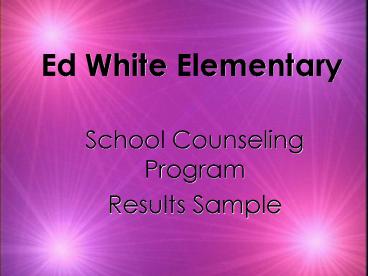Ed White Elementary - PowerPoint PPT Presentation
1 / 23
Title:
Ed White Elementary
Description:
Standard A: Students will acquire the knowledge, attitudes and ... By Suellen Fried and Mara Weyforth. Curriculum. Raise awareness of the roles of: Bully ... – PowerPoint PPT presentation
Number of Views:36
Avg rating:3.0/5.0
Title: Ed White Elementary
1
Ed White Elementary
- School Counseling Program
- Results Sample
2
National Standards Personal/Social Domain
- Standard A Students will acquire the knowledge,
attitudes and interpersonal skills to help them
understand and respect self and others. - Standard B Students will make decisions, set
goals and take necessary action to achieve goals. - Standard C Students will understand safety and
survival skills.
3
Student Competencies
Personal/Social A2.1 Recognize that everyone
has rights and responsibilities A2.6 Use
effective communication skills B1.4 Develop
effective coping skills for dealing with problems
4
Guidance Curriculum
- Grades 5-6
- Roles in bullying situations
- Anti-bullying strategies
- Control over bullying situations
5
Process Data
- Who 107, 5th and 6th grade students
- What Counselor created lessons on the effects of
bullying and anti-bullying strategies - When 3, 30 minute lessons in the regular
classroom
6
Perception Data Pre Post
- 38 demonstrated knowledge of anti-bullying
strategies and roles in bullying
- 82 demonstrated
- knowledge of
- anti-bullying
- strategies and
- roles in bullying
7
Perception Data
Knowledge of anti-bullying strategies and roles
in bullying
8
Behavior Data 2006-2007 Office Referrals
- Pre
- 30 reports
- involving
- bullying during
- 1st semester
- Post
- 20 reports involving bullying during 2nd semester
9
Office Referrals for Bullying
Bullying referrals were reduced by 33
10
Intentional Guidance
- While all students already receive
anti-bullying guidance curriculum in K-6 our
data indicated that we needed additional
intervention at the 6th grade - 32 reported feeling bullied on 2005 School
Climate survey - 40 of girls and 50 of boys reported feeling
bullied on the 2006 Iowa Youth Survey
11
National Standard Personal/Social Standard A
- Students will acquire the attitudes, knowledge,
and skills that contribute to effective learning
in school and across the life span.
12
Student Competencies
Personal/Social A2.1 Recognize that everyone
has rights and responsibilities A2.6 Use
effective communication skills B1.4 Develop
effective coping skills for dealing with problems
13
On Target To Stop Bullying
A Project from the Heart of The STOP Violence
Coalition Kansas City, Missouri By Suellen Fried
and Mara Weyforth
14
Curriculum
- Raise awareness of the roles of
- Bully
- Target
- Witness
- Develop Strategies to stop bullying behaviors
- Increase student awareness of empathy respect
for other students
15
Targeting Improved Peer Relations
- Identify and decrease incidents of bullying
- Increased knowledge of supporting targeted
students and creating a safe, respectful
environment for learning - Empower attitudes that enhance empathy and
respect. - Demonstrate assertive skills in role play
16
On Target Strategies
- Collect and share student data
- Educate on bullying and effects
- Build empathy worksheets
- Role play assertive skills
- Utilize student driven problem solving
- Engage staff in a proactive policy and
implementation
17
Perception Data
- Pre
- 58 of students know how to stop bullying
- Post
- 76 of students know how to stop bullying
18
Perception Data of students with knowledge
of anti-bullying strategies
19
Perception Data
- Pretest Students reported 665 incidences of
bullying - Posttest Students reported 505 incidences of
bullying.
20
Incidences of Bullying
Student reports show a 24 reduction in bullying
in the 6th Grade
21
Implications
- The results show that the anti-bullying
- guidance curriculum and On Target
- intentional program have increased knowledge of
- anti-bullying strategies and decreased the number
of - bullying incidences reported by students.
- Although these interventions have been
successful, - further interventions are needed. Ed White is
- implementing 6 Steps to a Trouble Free Playground
- and the Olweus Bullying Prevention Program in
2007- - 2008
22
Further ImplicationsYear to year data will be
collected (spring to spring) for more accurate
data collection.Progress reports and playground
data will provide more accurate behavior data.
23
Thank you for your support of the counseling
program. Lorri Gettes































